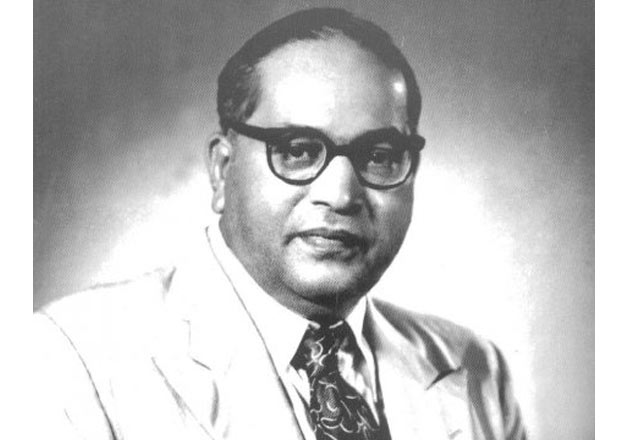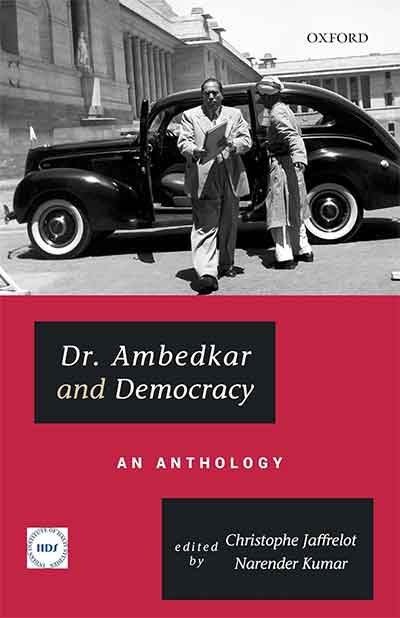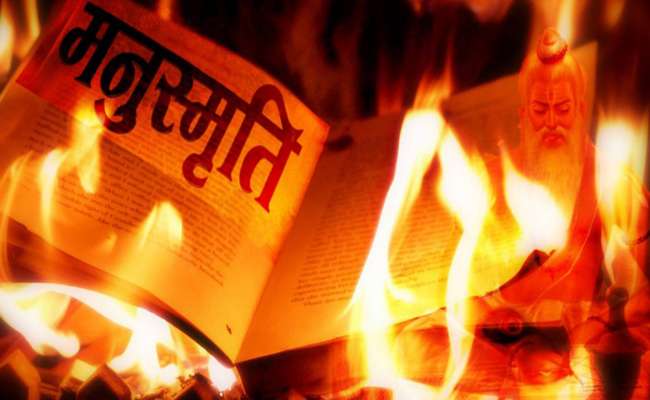
( The following are extracts from A paper presented by Dr KS Sharma at the XXXII Indian Social Science Congress held at New Delhi from 18′” December to 22nd December 2008. The Paper quotes Dr. B. R. Ambedkar extensively and seeks to bring out some views he had expressed at one stage in his political life. A few extracts focussing on parliamentary democracy from the same Paper were published in Countercurrents.org of 14 April, 2016, to mark the 125th birthday of Dr. B.R. Ambedkar on April 14. The following Extract is relevant on the eve of May Day. Beyond paying lip service, neither Ambedkarites nor official Leftists, including those in trade union field, remember or remind these views. The previous extract begins with highlighting his statement thus : ‘Parliamentary Democracy is…in reality a government of a hereditary subject class by a hereditary ruling class’ : Ambedkar . And asks the working class to take note of this fact. Some statements may find repetition so as to clarify the subject. Emphases added. )
The following views of Dr.Ambedkar are extracted from the speech he delivered at the concluding session of the All India Trade Union Workers Study Camp held in Delhi from 8th to 17lh September 1943 under the auspices of the Indian Federation of Labour. This historic document seems to have been lost sight of by political pundits, who are severe critics of parliamentary democracy. After a perusal of Ambedkar’s views presented on the above occasion, anybody would say that it looks as if he was speaking of Parliamentary Democracy as prevalent today…..
In his opening remarks Dr.Ambedkar says that “as the autocracy of Despotic Sovereigns was replaced after a long and bloody struggle by a system known as Parliamentary Democracy, it was felt that this was the last word in the frame of Government. It was believed to bring about the millennium in which every human being will have the right to liberty, property and pursuit of happiness. It is therefore a matter of surprise that there has been a revolt against Parliamentary Democracy although not even a century has elapsed since its universal acceptance and inauguration”.
Dr.Ambedkar says:
“I have no doubt that what has ruined Parliamentary democracy is the idea of freedom of Contract. Parliamentary Democracy took no notice of economic inequalities and did not care to examine the result of freedom of contract on the parties to the contract should they happen to be unequal. It did not mind if the freedom of contract gave the strong the opportunity to defraud the weak. The result is that Parliamentary Democracy in standing out as protoganist of liberty has continuously added to the economic wrongs of the poor, the downtrodden and the disinherited classes”.
And adds : “Democracy is another name for equality. Parliamentary Democracy developed a passion for liberty. It never made even a nodding acquaintance with equality. It failed to realize the significance of equality, and did not even endeavour to strike a balance between liberty and equality, with the result that liberty swallowed equality and has left a progeny of inequities“. ( It may be added : In reality, in post-1947 India , even liberty remains a mirage, it disappears the moment rights are sought to be exercised by toiling classes and their supporters.)
Dr.Ambedkar further says: “All political societies get divided into two classes – the rulers and the ruled. This is an evil. If the evil stopped here it would not matter much. But the unfortunate part of it is that the division becomes, stereotyped and stratified so much so that the Rulers are always drawn from the Ruling Class and the class of ruled never becomes the Ruling Class. People donot govern themselves; they establish a government and leave it to govern them, forgetting that it is not their government. That being the situation, Parliamentary Democracy has never been a government of the people or by the people and that is why it has never been a government for the people. Parliamentary Democracy, not withstanding the paraphernalia of a popular government, is in reality a government of a hereditary subject class by a hereditary ruling class.”
Dr.Ambedkar poses the question “who is responsible for this?” and answers it without mincing words, thus: “There is no doubt that if Parliamentary Democracy has failed to benefit the poor, the labouring and the down-trodden classes, it is these classes, who are primarily responsible for it”. How true! The exploited classes have never been conscious of their exploitation and have not realized that they are the “masters” in a Democracy but have been reduced to “subjects”, because of their unconsciousness and ignorance.
Dr.Ambedkar, presents his analysis as follows: “In the first place, they have shown most appalling indifference to the effect of the economic factor in the making of men’s life….The labouring class far from being fat like pigs are starving, and one wishes that they thought of bread first and everything else afterwards …. The labouring classes have failed to acquaint themselves with literature dealing with the government of mankind. Everyone from the labouring classes should be acquainted with Rousseau’s Social Contract, Marx’s Communist Manifesto, Pope Leo XIII’s Encyclical on the conditions of labour and John Stuart’s Mill on liberty, to mention only four of the basic programmatic documents on social and governmental organization of modern times. But the labouring classes will not give them the attention they deserve. Instead, Labour has taken delight reading false and fabulous stories of ancient Kings and Queens and has become addicted to it”.
In the above analysis Ambedkar on the one hand alerts the labouring and the poor that, they are starving without necessary food and on the other, are illiterate and ill-equipped. He directs them to study basic works like that of Rousseau’s Social Contract, Marx’s Communist Manifesto, Pope Leo Kill’s Encyclical on the conditions of labour and J.S. Mill’s on liberty. Ambedkar strongly considers that every one from the working class must be proficient in the understanding of the above basic documents to enable oneself to fight the exploiters. He condemns working class reading fables of Kings and Queens, which are false and fictitious.
He continues to analyse this aspect and says: “There is another and bigger crime which they have committed against themselves. They have developed no ambition to capture government, and are not even convinced of the necessity of controlling government as a necessary means of safeguarding their interests. Indeed they are not even interested in government”.
Dr.Ambedkar calls it a crime committed by the working class against themselves, for not developing the ambition to capture government. This caustic remark against the labouring class, should awaken this entire fraternity to their colossal ignorance and dawn on them the realization to become the governing class.
Dr.Ambedkar laments that of all the tragedies which have beset mankind the biggest is that whatever organization the working class has, has taken the form of Trade Unionism. He categorically states that “it would be a great mistake to suppose that Trade Unions are a panacea for all the ills of labour”. He further says: “Trade Unions even if they are powerful, are not strong enough to compel capitalists to run capitalism better. Trade Unions would be much more effective if they had behind them a labour government to rely on. Control of government must be the target for labour to aim at. Unless Trade Unionism aims at controlling government, trade unions will do very little good to the workers and will be a source of perpetual squabbles among trade union leaders”.
Ambedkar was very categorical and clear that until and unless trade unions aim at emerging as the governing power, they will serve very little purpose and would only be a source for perpetual squabbles among trade union leaders themselves.
“Free independent nation-state turns to be the enemy of the working class under the hegemony of their masters”
Dr.Ambedkar further said: “The third besetting sin of the labouring class is the very way which they are led away by an appeal to nationalism”. This remark coming from Ambedkar exhibits the depth of his understanding of the class dimension of nationalism, which is a product of industrial revolution and came to be used by the bourgeois for strengthening and perpetuating capitalism. To put it in the words of Ambedkar himself :
“The working classes who are beggared in every way and who have very little to spare, often sacrifice their all to the so-called cause of nationalism. They have never cared to enquire whether the nationalism for which they are to make their offerings will, when established, give them social or economic equality. More often than not, the free independent nation-state which emerges from a successful nationalism and which reared on their sacrifices, turns to be the enemy of the working class under the hegemony of their masters. This is the worst kind of exploitation that labour has allowed itself to be subject to”.
How realistic Ambedkar is when he presents this succinct analysis! This reminds one of the Marxian concepts of Bourgeois Nationalism and Proletarian Nationalism. The Nationalism practised by the capitalists, uses nationalism as an opium to intoxicate the workers into an unconscious state in which they are made to believe that they are working for the Nation, while they are in fact working for the capitalists, the Ruling Classes. Ambedkar rightly warns the working class against such day light betrayal.
Having pointed out the wrong organizational aspects, Dr.Ambedkar proceeds to suggest remedies for these maladies. He says: “If the working classes have to live under a system of Parliamentary Democracy then it must devise the best possible means to turn it to their benefit. As far as I see, two things are necessary, if this object is to be achieved”. These necessities are spelt out by him as follows: “The First thing to do is to discard mere establishment of Trade Unions as the final aim and object of Labour of India. It must declare that its aim is to put labour in charge of government. For this it must organize a labour party as a political party. The Second thing for Labour in India is that without knowledge there is no power. Labour will have to prove positively that it can govern better”.
The above prescriptions prescribed by Ambedkar have far reaching repercussions and consequences. The working class must become the ruling class and must through their power of knowledge and conviction, prove that the working class can govern better than the capitalist class.
Ambedkar gave certain directions to the prospective labour government. He said “Labour government cannot be a government of Laissez faire. It will be government which must essentially be based on a system of control. A system of control needs a far greater degree of knowledge and training than a Laissez faire government. Labour in India has not realized the importance of study”. He concluded his analysis by stating “Labouring Classes have to be raised to the status of a governing class”. This statement of Ambedkar is reminiscent of the statement of Karl Marx in “Communist Manifesto”, wherein he said “The first step in the revolution by the working class is to raise the proletariat to the position of ruling class, to win the battle for democracy”.
It is important to note that Karl Marx, the founder of Scientific Socialism had given this prescription of the Proletarian Class becoming the Ruling Class in order to put an end to the exploitative capitalist system.
What is surprising and perplexing is that, even though Dr.Ambedkar had the courage to tell Indians that it is “not the best product” and to be “beware of Parliamentary Democracy”, the question that arises is, why did he subscribe to this form of governance, as the architect of the Indian Constitution? It looks paradoxical, but the only plausible explanation that can be given is that, after all he was the Chairman of the Drafting Committee, and he had no personal option, but to honestly reflect the wisdom of the Constituent Assembly,
( Post- Script : It is another matter that Ambedkar himself, in the later years, did not focus on these goals that he set in his speech of 1943. Why ? This question needs to be further studied. Three points may be noted in this context:
1) For the present, it may be noted that his priorities and pre-occupations were undergoing a change culminating in his being coopted as Chairman of Drafting Committee of the Constitution, and later into Nehru’s Cabinet:
—- Independent Labour Party (ILP) was an Indian political organisation formed under the leadership of Dr. Ambedkar in August 1936. It may be noted that the Labor Party in UK experienced a further split in 1932 when the the Independent Labour Party, which for some years had been increasingly at odds with the Labour leadership, opted to disaffiliate from the Labour Party. Thus ILP was the same name used in both India and UK.
— April 1942, Dr. Ambedkar founded the All India Scheduled Castes Federation in Nagpur in the place of ILP. Later, after the Federation failed to make its mark in electoral politics, with Ambedkar himself being defeated in Loksabha elections in 1952 and again in bypolls of 1954, he decided, in the months before his death in 1956, to dissolve ALL INDIA SCHEDULED CASTE FEDERATION and contemplated an alternative party. On 2nd OCTOBER 1957, Gandhi Jayanti if only coincidentally, ALL INDIA SCHEDULED CASTE FEDERATION WAS FORMALLY DISSOLVED AND a NEW REPUBLICAN PARTY OF INDIA was launched. These organizational developments show the shifts in the policies and practices of Dr Ambedkar, the politician.
–Meanwhile , in 1941 July Dr.Ambedkar was appointed by the British to sit on the Defence Advisory Committee.
–On 1942 July 20, Dr.Ambedkar joined the Viceroy’s Executive Council as a Labour Member.
–1944 Dr. Ambedkar founded “The Building Trust and the Scheduled Caste Improvement Trust”.
2) The ideological roots of Ambedkar are one reason and the above should be seen in that light. Anand Teltumbde, for instance, analyses it in his article titled Ambedkar And Communists, published in Countercurrents.org of 16 August, 2012. Teltumbde writes:
“Ambedkar was not a Marxist. His intellectual upbringing has been under Fabian influence in Columbia University and London School of Economics, the institution founded by the Fabians. John Dewey, whom he held in such high esteem as to owe him his entire intellectual making, was a known American Fabian. Fabians as is well known wanted socialism but not as Marx proposed. Bernard Shaw one of the pillars of Fabianism famously wrote, “Marx’s Capital is not a treatise on socialism; it is a gerrymand against the bourgeoisie”. Fabians believed socialism could be brought in an evolutionary manner not through revolution. Notwithstanding these influences, Ambedkar without agreeing with Marx, took Marxism not only seriously but also used it as the benchmark to assess his decisions throughout his life.”
3) It is to be noted that Ambedkar’s speech (1943) was made in the years of Second World War when bourgeois nationalism was at its worst and mired in wars, when Germany under Hitler claimed as its ideology National Socialism which was another name for fascism as it soon became clear to one and all. So Ambedkar was devastatingly critical of nationalism and alerted the working class against it. The British imperialists were in the opposite, anti-fascist camp. When Ambedkar made his speech, labor politics and economics were on the rise. The British Labor Party was on the rise reaching its peak during and after Second World War, polling almost 50 percent of vote. It became a ruling party in UK, off and on eversince 1924. It was the period of Labor socialism and Municipal socialism, guided by Keynesian Economics, as they were called. His pro-labor views and views on nationalism and may be viewed in that context. London School of Economics where many Indian and British politicians, including Ambedkar, were schooled had its own influence on Labor politics and economics. )
( Dr KS Sharma (born 1934), a Retired Professor of Law based at Hubli, Karnataka, has been a leader of working class for over 45 years now, focused on unorganized labor, and as Founder-President of Karnataka State Govt. Dailywage Employees Federation, successfully organized one lakh dailywagers of Govt of Karnataka who got regularized after 30 years of struggle that included street battles and legal battles going upto Supreme Court. He is a great teacher, poet, writer, dramatist, literary critic, columnist, publisher, orator, and an activist–social scientist who was a Vice-President of ISSA , Indian Social Science Academy, for some time. Post-retirement, he did his doctorate on Indian State : From Marxian Perspective. He is the Founder President of a group of Institutions including an ITI, Institute of Naturopathy and Yoga, Dr. Da Ra Bendre (Jnana Peeth Awardee) Research Institute, Indian Institute of Marxist Theory and Practice, FMRRC- Fluorosis Mitigation Research and Resource Centre all located in Vishwa Shrama Chetana campus, Hubli. He may be contacted at : [email protected]















































